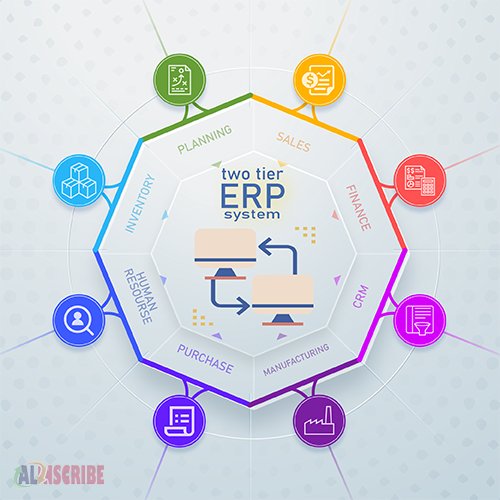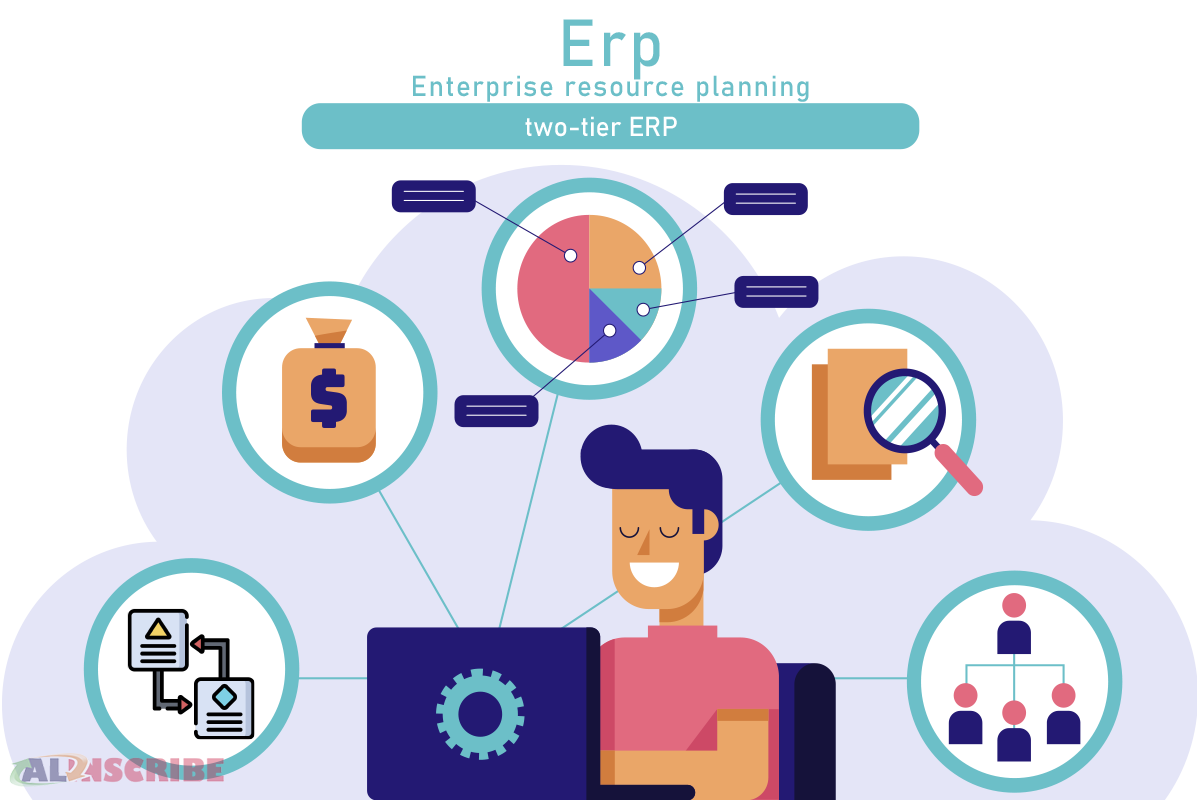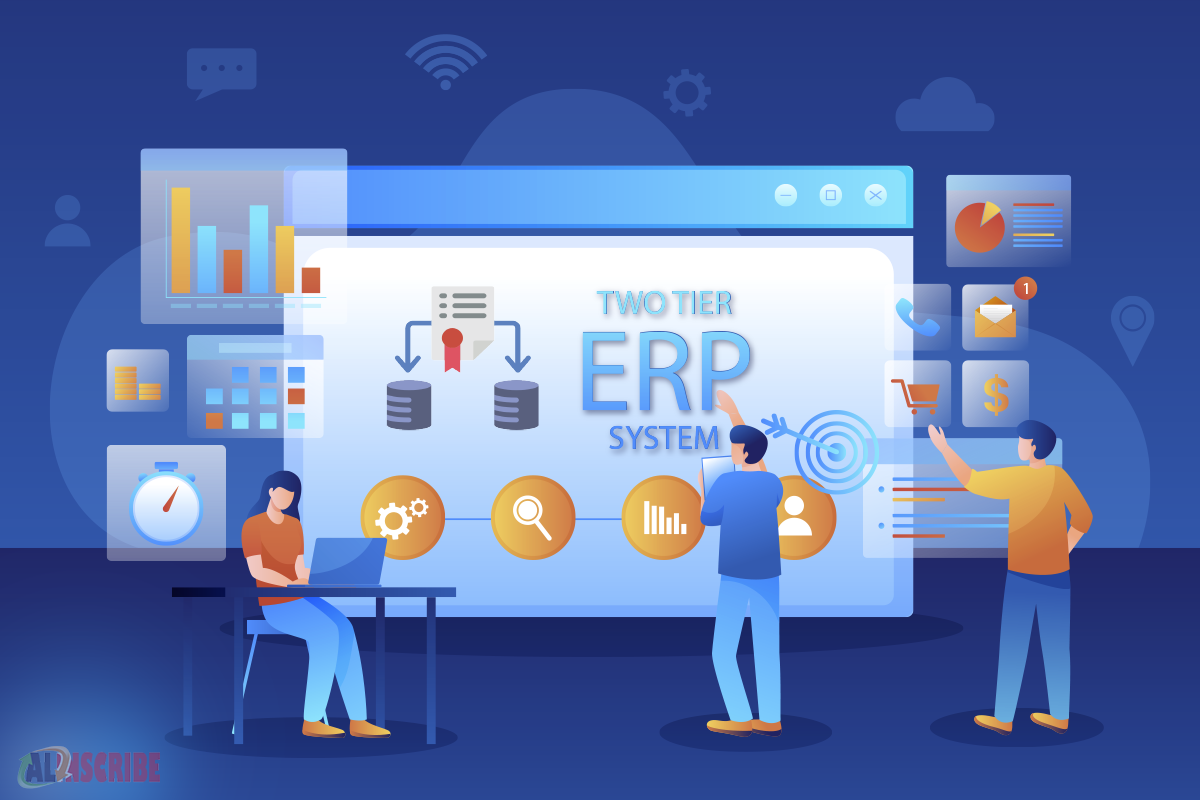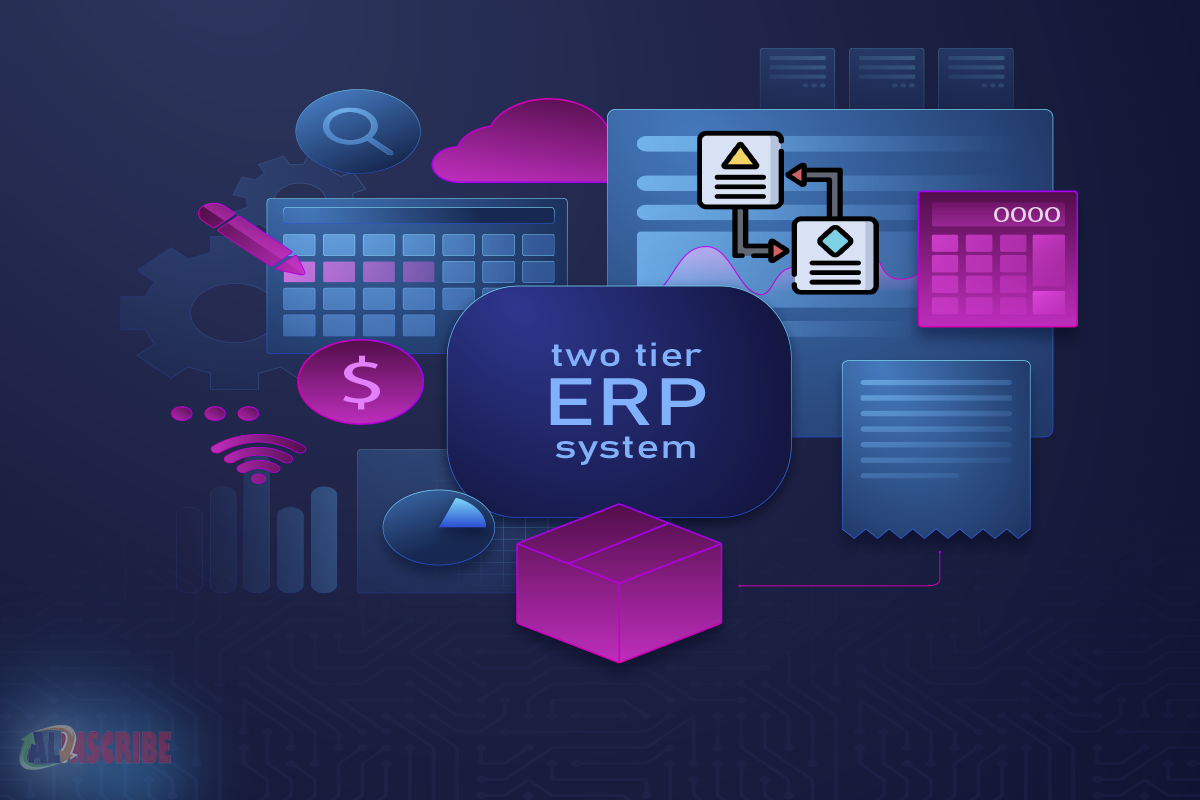What Is Two-tier ERP Integration And How Does It Help In Your Business?

Introduction
ERP & CRM has become a necessity in this era of digitization. Companies and businesses that are using ERP, Enterprise Resource Planning systems, tend to show less amount of manual error in the course of their operation. And the reason behind it is quite simple, which is automation. With technical help it is nothing tough to reduce manual effort and errors.
Even though ERP systems make it simple for the companies, it itself is a quite tough subject to be understood. Especially when technology has been evolving every single day and there is something new to learn almost every single day, ERP innovation has extended its boundaries as well. Two-tier ERP integration is one of these evolving technical conceptions that has been widely accept by the large enterprises in recent times.
In this article we will discuss about tier 2 ERP systems. This article will also include the benefits that can be acquired by the companies if they consider using two-tier ERP system.
The concept of two-tier ERP integration
Two-tier ERP integration is a technology used by ERP systems for coping up with the needs of a large company. In the course of two-tier ERP strategy, the headquarters of the company uses tier 1 of the ERP system. This tier 1 is originally a more customized and advanced version of the ERP. This also includes all the features and functionalities that are needed for managing a global business. While on the other hand, the smaller business units or the subsidiaries use tier 2 ERP systems. Tier 2 is not as advanced as tier 1 usually, but it can still manage the business related needs of the smaller units.
When a business opts for a two-tier ERP integration, they will automatically have to work with two ERP systems. In this case the information flow from tier 2 to tier 1. With the help of this strategy, the companies can easily initiate a master data management. The tier 1 of the ERP systems usually manages the core functionalities of business including, human resource management, finance management and more. Tier 2 ERP system usually manages activities like marketing sales and manufacturing process.
The concept of two-tier ERP integration rose to popularity when large companies realised that legacy ERP system is far more rigid and expensive that two-tier ERP systems. Two-tier ERP systems are usually economical and take less work than moving an entire ERP system to a new one. It also enhances performance of the company much more effectively and efficiently than the legacy ERP systems, which are predominantly on-premises ERP system. In this scenario, it is safe to say that the course of two-tier ERP integration are certainly a better approach for the large companies.

Difference between Tier 1 and tier 2 ERP systems
Each of the tier are associated with different capabilities. Hence, there are some differences that persist between these two tiers. The biggest difference of these two tiers is the size of business those are meant for. The other differences are presented below,
Tier 1
- Tier 1 ERP is built for the large businesses with a number of subsidiaries. These are also ideals for businesses having branches all around the globe.
- Tier 1 ERP systems are usually very expensive. These are quite hard to install and maintain as well.
- This tier can be customized very well. However, customizing it while meeting all business requirements is quite time-consuming.
- Large companies usually have a dedicated IT team to manage the ERP system.
Tier 2
- Tier 2 ERP is designed for small and medium sized companies.
- Tire 2 ERP systems are less expensive than tier 1. These are also easier to install and maintain.
- Tier 2 ERP systems may not have every possible functionality. These are sometimes designed for a specific category, such as manufacturing and retail.
- However, some of the solutions offer other functionalities, such as human resource, accounting and more.
- These type of ERP systems sometimes offer inventory management as well.
Thus, there are certainly some clear differences between two of the tiers. However, these differences are what makes the concept of two-tier ERP integration efficient. As two tiers are designed for different purposes, large companies find it easier to manage business effortlessly.
Advantages of two-tier ERP
The primary advantage of using two-tier ERP system is better security. Using a single system for both headquarters and subsidiaries means giving access to more people than one can even imagine. Hence, there is always a chance of data breach or confidential data being leaked and so on.
However, when you work with two-tier ERP systems, you separate your confidential business related data from the data that need to be accessed every day. In this way, security is enhanced and so is performance. Dedicating an ERP software to perform some specific tasks rather than performing every task with the same software is certainly faster. Hence, the performance of the company is enhanced upon implementing two-tier ERP integration.
Nevertheless, it can’t be said that there will not be any disruption while using a two-tier ERP system. If the Tier 1 ERP is way too advanced, then it is only likely to expect that Tier 2 ERP system will face some issues will being integrated, or those may not at all integrate. Moreover, the lack of a prominent financial functionality in tier 2 ERP system can cause some prominent issues.
Still, possessing a two-tier ERP integration brings more positives than negatives. Therefore, opting for one of these is certainly beneficial if your company is large and in need of a more enhanced performance. Additionally, there are a number of benefits that can be acquired by the companies wile they work with a two-tier ERP integration. Some of the benefits that your company can gain with the help of this innovative ERP approach, are presented in the following section.
In the case of two-tier ERP systems, tier 1 needs to be a heavy-weight ERP system that can support complex tasks associated with a company headquarters. Tier 2 can be a light-weight ERP system that can easily handle the tasks and operations associated with the branches and subsidiaries. In this scenario, it needs to be stated that Tactic ERP & CRM can be an effective tier 2 system. Tactic ERP & CRM possesses that every feature that establishes itself as a successful tier 2 system.
Tactic’s modules are highly customizable; hence, those can be easily molded in a way that can support small subsidiaries and maintain a streamlined flow of data with the headquarters by being integrated with the tier 1 systems. Tactic’s user-friendly interface, makes it easy to be navigated by staff with limited training in handling ERP and CRM system. Hence, there’s no doubt about the fact that Tactic ERP & CRM can be an excellent choice for the tire 2 ERP.

Benefits that your business gain when you opt for two-tier ERP integration
As mentioned in the above section, there are a number of benefits that can be gained by the companies while using two-tier ERP system. These benefits are discussed below,
Better flexibility and control over business processes
Tier 2 ERP systems are much less complex than tier 1, hence, it is much easier to customize for short-term or temporary changes. The companies can adjust it as per their needs. Therefore, this empowers the flexibility and control that the subsidiaries need to address the changes in market or shifts in customer behaviour. Moreover, the subsiders can control their operations in a better way with the help of these ERP systems.
On the other hand, tier 1 is very customizable but for a long-term duration, which also means it can be flexible with the company’s business practices. Additionally, once tier 1 is adjusted as per the requirements, there is hardly any need to change that.
Cost-effective
The most beneficial aspect to be associated with the course of two-tier ERP integration is the fact that it is actually much more cost effective than it seems to be. There are several companies that are having to invest a lot of fortune in ERP systems. When a company uses only one ERP system for both of headquarters and subsidiaries, the installation and the maintenance cost reach up high. However, in the course of two-tier ERP integration, tier 2 ERP systems require less attention. Hence, the company can reduce IT related expenses for the subsidisers. Moreover, the total implementation, installation, and upgrade costs a lot less than the legacy ERP systems would.
Meeting business needs better and faster
Implementing two-tier ERP integration helps in meeting specific business needs better. As the subsidiaries are meant for acquiring less responsibilities and can run on less efforts and resources, tier 2 ERP systems work perfectly for those. As the ERP systems are tailor-made for the small businesses, those fit perfectly with all the requirements of the small branches. Hence, business needs are met better and faster. The same happens with tier 1 as well. As tier 1 is highly customizable, the companies can make it something very worthwhile to them, which certainly ends up benefitting them all together. And when these two systems are integrated together, those are bound to provide with the best results.
Enriched user experience
While tier 1 ERP systems are quite tough to understand and use, tier 2 ERP systems are much simpler. Thus, if tier 1 was to be used by the entire organisation, it would cost a fortune for training the users. Even though training is certainly needed to use the tier 1 but that stays within the limits of the headquarters. Tier 2 hardly needs any training, moreover, the ERP vendors have their own tutorial videos and written wiki pages for helping the users to understand the systems. This indirectly enhances the user experience, as they get to learn by themselves, and saves time of training.
Addressing local requirements
A company having business beyond domestic boundaries, needs to deal with various currencies, market structure and so on. Therefore, it is always convenient for the subsidiaries to use a different system that is built based on their local requirements. It helps the branches to respond to local demand in a better and faster manner. Also, the tier 1 can effectively act upon any changes that happen within the company without having to worry about the external market. Two-tier ERP systems make the work much smoother while making changes easy.
Therefore, it is certainly beneficial for the large companies to consider the assistance of a two-tier ERP for managing their business operation in a better and more streamlined manner. However, you can not choose any ERP systems you like when it comes to choosing the right ones for your business. Therefore, you need to consider certain points before choosing the systems. These points are discussed in the next section.

Things to consider before choosing an ERP for a Two-tier strategy
Two-tier ERP systems are certainly an innovative approach that will level up your business processes. However, it has its own dark side. If you fail to choose the right ERP systems, then it can end up in complete destruction. This is why we have decided to make you aware about some of the points to consider before you choose an ERP. The points are mentioned below,
Integration
Integration is the most important factor to be considered. Before you choose a tier 2, you need to make sure that your tier 2 is capable of integrating with tier 1. If the tiers end up not integration, then it can result in a great mishap. If the two systems integrate well, it will enhance the flow of information. The assurance of a central and accurate source of information will reduce the need of manual data entry.
Requirements
Going through your business’s requirements is one of the most important activity to invest time in for choosing the right system. For example, if your business is international then you will have to choose a tier 2 ERP system that supports multicurrency and multilanguage setup.
Cost
Calculate the total cost of the operation before you opt for a two-tier ERP system. Make sure that the cost of tier 2 does not become onerous. You can also go with a SaaS ERP, which are usually much faster and requires the minimum maintenance to run smoothly. SaaS are quite affordable as well, which certainly benefits the company by reducing its overall operational costs.
Apart from the above mentioned points, the course of adaptability needs to be considered as well. It is crucial for the ERP systems to be adaptive enough to adapt the business model of your company.
Conclusion
This article makes it clear enough that opting for a two-tier ERP system is certainly very worth-while for the large companies with a lot of subsidiaries all over the globe. However, the companies need to choose both of the ERP systems very wisely. Choosing the right systems and working with the same while having dedicated IT teams to take care of the technical requirements will certainly save operational costs of the companies. Hence, the concept of a two-tier ERP system certainly takes the innovation of ERP a step ahead.
Article Comments
Similar Articles
Articles Search
Sponsor
There are zero sub-categories in this parent category.
There are zero sub-categories in this parent category.
There are zero sub-categories in this parent category.
















